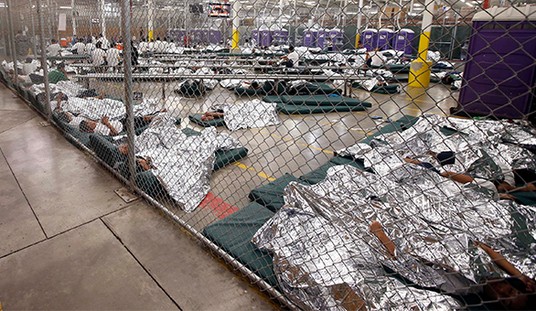Ross Douthat argues that Angelo de Codevilla‘s argument about the existence of an American ruling class trying to impose its will on the people is overdrawn. The ‘overclass’, he argues, is on closer inspection not there. And if even it were, it is by no means monolithic in its views. So how can a group itself divided be a conspiracy? Douthat takes the issues of free trade and small government as an example of how ‘left’ can somehow think ‘right’.
the line between statism and small-government conservatism runs through many human hearts, rather than cleanly dividing Ivy League graduates from Tea Partiers and Middle Americans. And it’s essential to recognize that there are economic issues on which the American overclass — which, after all, includes the corporate as well as the political and intellectual elite, and thus tends to be center-left and Clintonian rather than deeply left-wing — sits to the right of the country as a whole. There’s a lot more support for free trade in Wall Street and Georgetown than in Topeka or Little Rock, for instance, and historically (though this may be changing somewhat) the same has been true of entitlement reform as well.
But the characteristics of a ‘class’ are not as important as the existence of the means by which a clique may exercise power. Jay Cost argues in the HorseRaceBlog that the longest running problem in American political history has been the back room. When a backroom exists someone eventually goes there and tries to run the show from behind the scenes. Just who in particular occupies it at a given moment is a secondary problem. Cost argues that the explosive reaction to groups like Journolist arises not from an objection to journalists holding opinions, but with the idea that they are inside the backrooms and covering up for their existence. So when Douthat says there’s no ‘overclass’ the existence of Jourolist impugns not just him but everyone in his trade, perhaps unjustly. But that’s the problem with backrooms. We don’t know who is in them because they are in back. Cost writes about the long running struggle between cliques and political process in American history:
Our system of government provides for an open process in which free-wheeling debate is encouraged. That’s what happens when you combine freedom of speech with regularly scheduled elections. But certain partisan practices can take the most vital parts of the debate behind closed doors, as allies meet in secret to work out disagreements among themselves before they offer a public message to the country …
This is what gave birth to the party caucus – the closed-door meeting of like-minded partisans to work out differences without the public nosing in. …
War with France or Britain? A federal debt? A national bank? – the accusations that they traded in public were extreme. Adams was portrayed as a monarchist who was secretly coordinating with his perfidious allies, Hamilton and the Arch-Federalists, to impose uniform religious practices upon the country and install a Federalist King, all backed by a standing army that had been justified by ginning up war fever. Jefferson, on the other hand, was tagged as an amoral atheist and Jacobin leveler whose radical ideas would bring the violence and anarchy of the French Revolution to the United States. And sure, both sides swore that their intentions were not so treacherous, but really how could anybody know? The parties were too much like secret societies back then. Nobody was really sure why they made the pronouncements they did. …
Secret caucuses turn Americans off. They long have. This is why the Democratic party in 1828 instituted the practice of the party convention, a broad, open public meeting of the party’s members to work out differences in the light of day. Over time, the convention degenerated from an open and inclusive process into the “smoke filled” room that nominated Warren Harding.
So the problem with Journolist is it reminds us that the secret caucuses have returned. Not that they have ever left. But a glimpse into Ezra Klein’s discussion forum among journalists tells us how far up and down the line it has spread. In the movie Three Days of the Condor a CIA operative played by Cliff Robertson asks the Robert Redford character about the blow the whistle how sure he can be that the New York Times wasn’t part of the backroom.
Higgins: Hey Turner! How do you know they’ll print it? You can take a walk… but how far if they don’t print it?
Turner: They’ll print it.
Higgins: How do you know?
How do you know? Well thanks to Journolist we know. So when Codevilla asks whether “the revolution it [country class and ruling class] continues to press upon America is sustainable” the offending term is not, as Douthat imagines, the precise definition of the “country class and ruling class” but the definition of the word “revolution”. Historically revolutions are part of the system design if it follows the political process. It is not ok if it occurs in the smoke-filled back room. Sooner or later those who ‘live’ by the backroom will ‘die’ from plots hatched in another backroom. Either that or the backrooms must be abolished. In this sense Douthat misses the point. The definition of who precisely comprises the overclass is less important than the existence of underhand methods it uses to impose its revolution. ACORN and the UAW and La Raza might be composed of blacks, latinos, blue collar workers and bureaucrats — groups that are not obviously members of an ‘overclass’. But that’s irrelevant. It is not who they are but whether they can change the rules of the game that is the key to the problem.
And there is some concern there is. One reason the so-called Great Right Wing Conspiracy has gotten a lot of traction — as evidenced by the administration’s decline in the polls — is because a lot of people feel they have been dealt out of the game. When sites like Emerging Corruption make available lists of Obama donors and allege that the NYT has not been looking at collusion between the President’s 2008 campaign and ACORN, they are pointing a finger not just at the Democratic Party but at the system itself.
Thus Codevilla’s essential argument remains telling despite his overemphasis on the sociological characteristics of the ‘overclass’. In that critique the current crisis is about the legitimacy of means and not about who exercises them. When Douthat derides the “blithe conviction that ‘true conservative’ good intentions trump policy substance and deep expertise” there is the implication that conservatives are unwilling to listen to arguments about what government should do. In fact the dispute is over whether government should be allowed to do it in the first place — especially in the way they have been doing it. It is about power and process rather than the fruits of the process. The desire to debate government bureaucrats who have “deep expertise” in health care rationing does not interest those who believe they lack the power to impose rationing at all.
So to Douthat’s assertion that people losing at the casino should simply acquire better “policy substance and deep expertise” to win more chips, Codevilla’s riposte is that you can’t win because the game is rigged. Not the player nor even the dealer, but the deck is under question. Whether Douthat’s or Codevilla’s view prevails is what 2010 election and the interregnum to 2012 are going to about. That election and the year following will decide whether politics will continue to be perceived as a process of power sharing between Republicans and Democrats or whether the current system itself has been judged and found wanting. 2010 and 2011 are not going to decide the answer; they are going to determine the question.
Which it is will be depends on both the actions of the left and the conservatives. If the left — or whatever anyone wants to call it — continues to press for the re-architecturing of American society it must follow that the conservatives will act not only to roll things back but act to break the power of the so-called revolutionaries. The left’s best strategy, one which it has adopted before, has been to fall back before the wire is tripped and when things calm down to tiptoe forward again. The significance of Clinton’s move to the right was to rob the conservative meme of its energy and bring action once again within the ambit of the status quo. Everybody went back to the tables. But Obama’s penchant for doubling down bids fair to achieve the opposite. At some point he may may bet the entire casino and then the chips as such, will lose their value.
Well, no one told me about her
The way she lied
Well, no one told me about her
How many people criedBut it’s too late to say you’re sorry
How would I know, why should I care?
Please don’t bother trying to find her
She’s not there










Join the conversation as a VIP Member